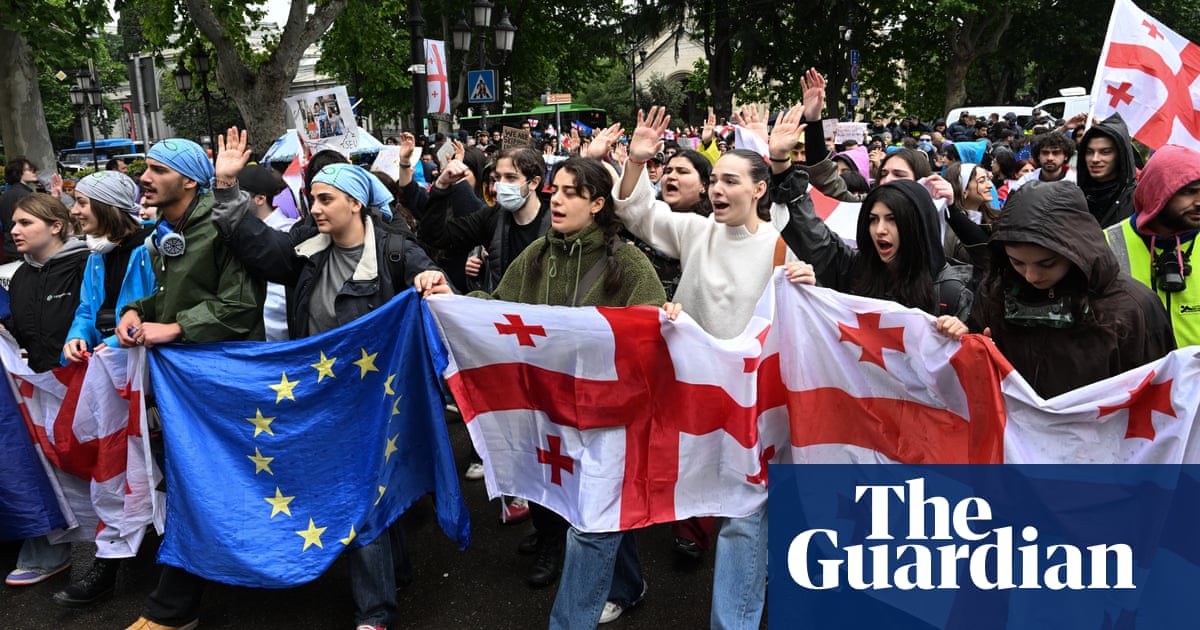Riot police used teargas to disperse protesters outside Georgiaâs parliament and MPs brawled inside as a âforeign agentsâ bill â condemned as a Kremlin-inspired act of repression â was passed into law.
The bill was backed by 84 MPs to 30 despite western pressure and the rolling protests that have brought hundreds of thousands of people on to the streets of the capital, Tbilisi.
A number of protesters were treated by medics after teargas was used on a noisy but seemingly peaceful crowd of a few thousand people, while squads of police dragged some individuals away.
The violence spread into the chamber, with a dozen MPs fighting and one MP, from the governing Georgian Dream party, being held back by security guards as he violently lurched at the chair of the main opposition, Levan Khabeishvili.
Under the legislation adopted on Tuesday, media or civil society groups in Georgia that receive more than 20% of their funding from abroad will have to register as âorganisations serving the interests of a foreign powerâ.
The US state department has called the bill âKremlin-inspiredâ, as it has echoes of legislation introduced into the Russian statute books in 2012 by Vladimir Putin, which many people say has been used to silence critics.
The president of Georgia, Salome Zourabichvili, has said she would veto the law, but the governing party has sufficient numbers in parliament to overrule her.
Georgiaâs prime minister, Irakli Kobakhidze, earlier on Tuesday met the US assistant secretary of state for European and Eurasian affairs, Jim OâBrien, in Tbilisi to discuss Washingtonâs concerns.
The prime ministerâs office said Kobakhidze had âexplained to Jim OâBrien the need to adopt the law On Transparency of Foreign Influenceâ and reiterated the âreadiness of the leadership team to carefully consider all legal comments of international partners within the framework of the veto procedure.â
Kobakhidze said on Monday that OâBrien had also requested a meeting with the billionaire oligarch Bidzina Ivanishvili, the honorary chair of the ruling Georgian Dream party, who is widely thought to drive government policy.
He said Ivanishvili â who made his fortune in Russia â rejected the request on the grounds that the US had frozen $2bn (£1.59bn) of his funds.
The European Commission on Tuesday restated its position that the new law would undermine Georgiaâs application to join the European Union. âEU member countries are very clear that if this law is adopted it will be a serious obstacle for Georgia in its European perspective,â it said.
after newsletter promotion
Tina Bokuchava, parliamentary leader of the opposition United National Movement said: âTodayâs vote will focus minds on the urgent need for regime change in Georgia. With elections to look forward to in October, I am confident that the unity seen on our streets in recent weeks will prove a watershed moment in our nationâs history.
âOur rightful place is in Europe â but the Ivanishvili stranglehold must be broken first if this dream is to be realised.â
On Monday, students from 30 Georgian universities joined the protests and went on strike, backed by lecturers.
Irakli Beradze, 22, a student in Tblisi, holding up a sign saying, âRussian canât gaslight us, we have gas masksâ, said that he and thousands of others âwould not let Russia have our countryâ.
But in a speech on Tuesday, a Georgian Dream MP, Archil Talakvadze, called critics of the new law a âradical and anti-national political opposition united by political vendettaâ.
âBut nothing and nobody can stop the development of our country,â he added.



